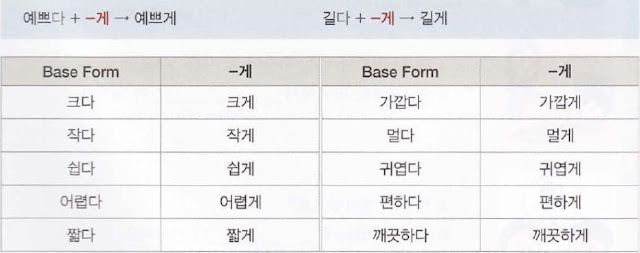 머리를 짧게 잘랐어요.
머리를 짧게 잘랐어요.
I cut my hair short.
오늘 아침에 늦게 일어났어요.
I woke up late today.
크게 읽으세요.
Please read it loudly.
Grammar Focus:
-게 functions as an adverb in a sentence and expresses the purpose, basis, degree, method of, or some thought about the action that follows. It corresponds to ‘in a… manner’ or ‘-ly’ in English. The adverb form is made by adding -게 to the stems of adjectives.
 Conversation:
Conversation:
A: 여보, 이제 무엇을 할까요? Dear, what should I do now?
B: 화장실 청소를 해 주세요. 깨끗하게 해 주세요. Please tidy up the bathroom. Make it clean.
A: 넥타이가 아주 멋있어요. Your necktie really looks nice.
B: 고마워요. 세일해서 싸게 샀어요. Thanks. I bought it cheap on sale.
A: 엄마, 오늘 날씨가 추워요? Mom, will the weather be cold today?
B: 응, 추우니까 따뜻하게 입어. Yes, it’s going to be cold, so dress warmly.
Notes:
1. Although the adverbial form of an adjective is made by adding -게 to the stem, in the case of 많다 and 이르다, the forms 많이 and 일찍 are used in favor of 많게 and 이르게.
많다一> 많이
A: 잘 먹겠습니다. Thank you for the food (idiomatic).
B: 많이 드세요. Please eat a lot.
이르다一> 일찍
A: 늦어서 죄송합니다. I’m sorry for being late.
B: 내일은 일찍 오세요. Please come early tomorrow.
2. There are also cases in which both the adverbial form -게 and a different form are used.
빠르다 一> 빠르게/빨리
• 비행기가 빠르게 지나가요.
The plane goes by fast.
• 이쪽으로 빨리 오세요.
Come this way quick.
적다 一> 적게/조금
• 소금은 적게 넣으세요.
Only a little salt, please.
• 커피 조금 더 드실래요?
Won’t you have a little more coffee?
느리다 一> 느리게/천천히
• 시계가 느리게 가요.
My watch is slow.
• 천천히 드세요.
Please take your time eating (eat slowly)
>> Full of ‘Korean grammar in use – Beginner’: Click here
>> Fanpage: Say Hi Korean
